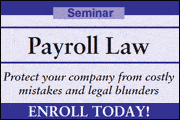Description:

|
A Day That Brings Clarity To Your Payroll Gray Areas! What you don't know can hurt you. That's never more true than when handling payroll. The first step to complying with regulations is understanding them. That's why you'll begin your day with a crash course in payroll's legal basics. You'll find out what areas fall under state, federal, and joint regulation, and learn how to avoid the often staggering penalties and fines of non-compliance. Handling payroll sounds like a simple proposition. Employees work at a certain rate of pay. You take out taxes and give them the rest of what they've earned. If only it were that clear cut. Regulations regarding special benefits and other payments turn a simple proposition into a legal landmine. Armed with the strategies you'll gain at this seminar, you'll handle payroll accurately, legally, and with complete confidence. Every employee's paycheck presents a different challenge. After this seminar, you'll know which forms to use when and, most important, how to keep your company out of hot water with the DOL and state agencies. It's their job to catch you in a mistake. Together, we'll make sure that doesn't happen. AGENDA: The New Basics Of Payroll Management - The high cost of improperly classifying employees
- Critical steps for new hire reporting - what you must do
- The most important thing to know about statutory employees
- Why payroll managers hold more responsibility today than ever before
- The legal importance of maintaining the distinctions between contract employees and staff
- What to do if you get an FLSA complaint
Making Sense Of The FLSA - The must-do's of FLSA record keeping
- Exempt vs. nonexempt employees: are you applying the FLSA properly to each?
- What are your company's responsibilities for travel time, on-call time, and time employees spend waiting on behalf of your company?
- Are all meetings and training deductible - even those that are primarily vacations?
- When are exempt employees eligible for overtime?
- Understanding overlapping federal and state wage and hour laws
- The important tip credit and what it means to your company's labor costs
- Comp time — the common illegal practice many companies unknowingly use
Special Pay Considerations: Perks & Benefits - When and how to tax fringe benefits such as company cars, club memberships, etc.
- The legal ramifications of paycheck advances
- When must prizes won at a company function be taxed?
- Gone to the Guard for the week — what to do when military pay and your payroll overlap
- Tips and uniform allowances: what's considered income, what's not?
- What you're required to pay when an employee is dismissed
- Compensation and fair market value: what the law says you must do
- Gifts that must be reported to the IRS
- Withholding and reporting rules for cash fringe benefits vs. non-cash fringe benefits
Special Circumstances / Special Treatment - When to withhold tax - before or after voluntary deductions
- Payroll procedures that signal trouble to auditors
- How to correctly follow the tax provision for low income families
- What is back-up withholding and when should you use it?
- The critical differences between W-4, W-4P, and W-4S forms
- Special must-do procedures for employing resident and non-resident aliens
- How to handle compensation for U.S. employees working abroad
CPE Credits Fred Pryor Seminars and CareerTrack are registered with the National Association of State Boards of Accountancy (NASBA), as a sponsor of continuing professional education on the National Registry of CPE Sponsors. State boards of accountancy have final authority on the acceptance of individual courses for CPE credit. CPE certificates will be available 10 days after your event has ended. Fred Pryor Seminars and CareerTrack are registered with the National Association of State Boards of Accountancy (NASBA), as a sponsor of continuing professional education on the National Registry of CPE Sponsors. State boards of accountancy have final authority on the acceptance of individual courses for CPE credit. CPE certificates will be available 10 days after your event has ended.
Also Available: Payroll Webinars On Niche Topics
Get training for InPat/Expat, Multi-State, Resident And Non-Resident Alien, Executive Taxation, Garnishments, Recordkeeping, and more!
Go to http://HRTrainingCenter.com/Payroll-Training.asp for more details. |